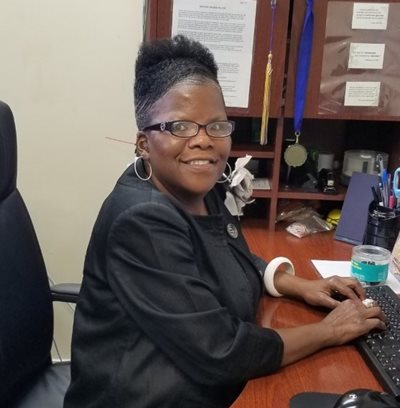Client Story: Doriscell Green
Doriscell, who is hard of hearing, worked hard to earn her degree and now she brings the same dedication to her job. With the assistance of effective hearing aids, she helps customers easily and has no problems communicating with her colleagues. This was not always the case though.
Years ago Doriscell worked with Vocational Rehabilitation (VR)* to get hearing aids so she could work. For her job, Doriscell needed to hear so she could field questions from customers, both in person and on the phone. These worked well for her for quite a while, but eventually the hearing aids were no longer functioning effectively.

Some customers at her work were rude and would ask to speak with someone else. While a few were understanding if they had previous experience with deaf and hard of hearing people. “If you have not experienced it [the deaf and hard of hearing experience] and you have hearing yourself, what would you expect?” Doriscell explained. Despite her compassionate approach to customers, Doriscell needed her hearing aids to work, so she reached out to VR.
Having worked with VR in the past, Doriscell expected them to finance her new hearing aids. Without her hearing aids she couldn’t be successful at work. However, after updating her file, VR turned her away, stating that her income was too high.
Doriscell was faced with a dilemma. She couldn’t afford the hearing aids herself, and she needed her job since she supported herself financially with no other help. Yet having a job was now preventing her from receiving functioning hearing aids. Doriscell explained, “I could not pay for a hearing aid. It’s not right to have to lose a job and risk becoming homeless” in order for VR to finance the hearing aids.
After speaking with her doctor who supplied her with temporary hearing aids, her audiologist recommended she contact Disability Rights Tennessee (DRT) for more support.Working with DRT, Doriscell and her advocate set up a meeting with VR. She made a request for an exemption to the VR policy. After advocating that the Financial Needs Assessment use her current actual income, rather than the prior year’s gross income, VR approved Doriscell for new hearing aids. Her Individualized Plan for Employment was amended and after almost two years of waiting, Doriscell was able to hear her customers again.
Now Doriscell’s hearing aids work “very well.” She consistently visits her audiologist to check their condition and function and continues being thankful to her doctor for helping her find the support she needed. “You need a doctor who knows what’s going on. That’s basically like you – an advocate. The doctor needs to be your advocate, too.”
Doriscell also reminds self-advocates that “patience is key. Make sure to get as much information as you possibly can. Keep asking questions. Be a self-advocate. Keep searching for answers. When your doctor can’t be your advocate, you have to be your own advocate.”
Now with a new job, one more related to her degree, and her fully functioning hearing aids, Doriscell is excited about her interactions with others at work. She no longer has to choose between hearing well and keeping her job. Instead she can let her skills shine.
DRT’s Client Assistance Program helps people who are trying to access VR services or who are having issues as a client of VR. If you need help, contact DRT at 1-800-342-1660 or at GetHelp@disabilityrightstn.org.
Learn more about the Client Assistance Program.
* The Vocational Rehabilitation Program (VR) provides a variety of individualized services to people with disabilities to help them prepare for employment in the competitive labor market. VR works with clients to create employment outcomes that are consistent with their individual strengths, resources, abilities, capabilities and informed choice. For more information about VR services, visit https://www.tn.gov/humanservices/ds/vocational-rehabilitation.html.
